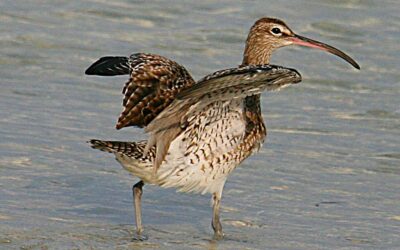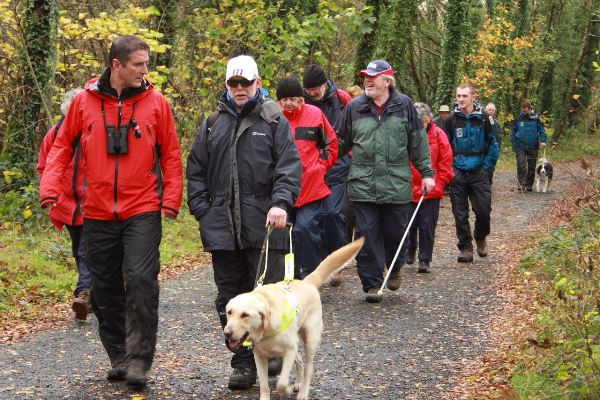 Environment
Environment 
The phrase “Well-being Factories” has been coined to describe National Parks (and other protected areas, for instance, the Areas of Outstanding Natural Beauty). It takes a common industrial concept and applies it to a green and pleasant cause, the production of well-being from the raw materials found within Wales’ landscapes; the ecosystem services we depend upon.
Promoting and facilitating the use of National Parks by everyone is important it enhances public health and reduces health inequalities. Research has shown that access to green-space has a positive impact on well-being and that people with access to the natural outdoors – that they can easily use and feel comfortable in – have higher levels of beneficial physical and mental activity.
The three Welsh National Park Authorities work within a context set by statue. They have two purposes; conserving and enhancing the natural beauty, wildlife and culture of each area; and promoting opportunities for the public understanding and enjoyment of the special qualities of each area. National Parks are also duty bound to seek to foster the economic and social well-being of their communities. In pursuit of their second purpose and the duty National Parks have long had a role in delivering social benefits that enhance well-being.
When they were originally designated around 60 years ago, the National Parks provided people living withinWales’ industrial towns and cities with areas of special beauty to exercise their mind, body and soul.
More recently the benefits of National Parks, easily accessed by those with the necessary means, have been shared with individuals with little or no experience of green spaces, let alone the countryside or the deep rural areas of Walesfound within National Parks. This work has been guided by the social inclusion strategies and action plans of the National Park Authorities. The latest version, the National Parks in Wales Social Inclusion and Child Poverty Strategy, is launched later today (23rd July 2012) by the Minister for the Environment and Sustainable Development, John Griffiths AM, at the Countryside Council forWales’ stand at the Royal Welsh Showground.
The promotion of social inclusion and the eradication of child poverty underpin the strategy. The social inclusion aspect was originally informed by the 2005 Social Inclusion Audit of the Three Welsh National Parks byCardiffUniversity. This piece of work provided an evidence base that informed subsequent strategies and action plans. The second, more recent, aspect which focuses upon child poverty derived from the duty on public authorities to produce a child poverty strategy contained within the 2010 Children and Families (Wales) Measure. The National Park Authorities agreed to work toward implementing two of the thirteen national aims:
i. to ensure all children grow up in decent housing
ii. to reduce inequalities in participation in cultural, sporting and leisure activities between children and between parents of children.
A better understanding of child poverty eradication is mainstreamed within the work of National Park Authorities, while the National Parks themselves are put to use improving well-being and social inclusion. The well-being outcomes and associated actions were agreed in consultation with local community groups inside and outside the National Parks.
National Park Authorities are unable to deliver the strategy on their own and work in partnership with local authorities, government agencies and the third sector to tackle the access barriers people continue to face. Success can be measured by the feedback National Park Authorities have received:
“The activities that we were able to organise (walking, indoor climbing, horse riding, canal boat trip, a trip to Brecon cathedral) are not normally available for a number of cultural, social and financial reasons. The BBNP is possibly somewhere alien for our group. The benefits were numerous and include physical, mental and social well-being improvements from being active in the beautiful natural environment of the BBNP” (SEWRECNewport)
“Geocaching was a great way for them to forget their troubles and to build on their confidence. Just by finding a geocache they experienced a great sense of triumph and achievement and walking in the Beacons had a truly positive effect on their general mood and well-being” (Brecknock Womens’ Aid)
“Enjoyed. Gave me something to wake up for and look forward to.” (Gwalia Housing)
The well-being factory dividend is experienced beyond the individuals and groups that the National Park Authorities engage with. Improved well-being capital within National Parks contributes to the well-being of the public at large. For example;
– The well-being of a family will be improved because the beach wheelchair initiative in Pembrokeshire allows families to play together.
– Fewer stiles and more gates in Snowdonia will assist the mobility impaired and also improve the walking and cycling experience of the general public, whatever their age.
– Socially excluded individuals presented with challenging positive experiences in the Brecon Beacons are less likely to disrupt and damage their home communities.
Improved well-being drives the National Park Authorities to deliver the triple bottom line of sustainable development – environmental; economic and social benefits. The Social Inclusion and Child Poverty Strategy launched today stresses that the National Parks exist for everyone to experience, explore and enjoy. They remain a unique resource forWales, and are ideally located to promote social inclusion. Their role as well-being factories will develop, contributing to the improved social fabric ofWalesas well as the tackling the environmental and economic challenges we continue to face.
Greg Pycroft is Policy Officer at National Parks Wales
Clare Parsons is Sustainable Communities Manager for Brecon Beacons National Park Authority


